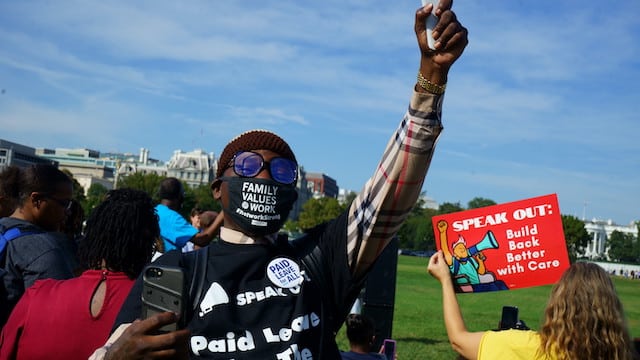FMLA’s Pandemic Anniversary: Money Matters

By Jennifer Morales, FV@W Network Learning Accelerator
The COVID-19 pandemic is a study in impossible choices: Get tested and be forced to stay home from work without pay if your COVID test is positive? Go to work sick and risk your health and that of your coworkers? Take time away from a paying job to supervise a child’s virtual education while school buildings are closed?
The painful economic and health choices that have been forced on working people all have the same root: a lack of financial support for our urgent caregiving needs, whether for ourselves or our loved ones, because the United States remains one of the few nations without a national paid family and medical leave program or a national paid sick days requirement.
As we round out our first full COVID year, we also commemorate the 28th anniversary of the unpaid Family and Medical Leave Act, signed into law by President Clinton in 1993. The law provides up to 12 weeks of job-protected leave to welcome a new child or care for one’s own or a family member’s serious medical need. While FMLA was an important step forward for working families, it applies only to companies with 50 or more employees and only to workers who have been with their employer for a year or more before taking leave. That leaves out 44 percent of the workforce. It also features a very limited definition of “family.” Sibling or mother-in-law or domestic partner going through cancer treatment and needing care? No protection for you.
These limitations have meant that very few workers of color and low-wage workers—who often work for smaller companies and change jobs more frequently—have been able to use FMLA. Due to pervasive racial discrimination in the workplace, these workers also have a harder time accessing promotions, accruing benefits such as paid vacation, and building up savings. So when a family or medical crisis arises, workers of color and low-wage workers often find they cannot afford to take the unpaid leave FMLA offers. Even while BIPOC (Black, Indigeous or people of color) workers face higher rates of serious health conditions like diabetes and lower access to health care, our nation’s failure to provide paid leave means they must continue to work through medical crises.
These same disparities are playing out during the pandemic, emphasizing how much money matters. Although Congress created the nation’s first paid leave and paid sick days programs through emergency COVID-19-response legislation last spring, those programs expired at the end of last year. That legislation also left out tens of millions of workers. And the relief package that replaced it offers reimbursement to employers who voluntarily provide paid time for virus-related care but requires nothing.
We need universal paid family and medical leave now to reverse historic racial inequities and protect working people’s lives and livelihoods, during the pandemic and beyond. Call on Congress to pass the Biden-Harris American Rescue Plan, that includes paid leave for all employees related to pandemic needs, as well as the FAMILY Act to create a permanent program.